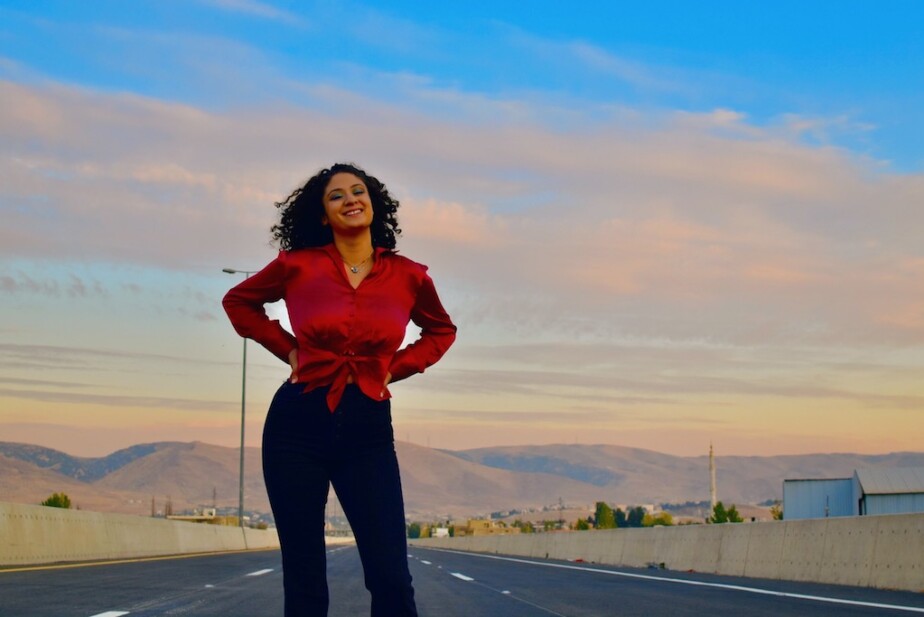
The following post was written by Bridge Year Fellow Farah Heikal. Farah spent the first half of her Bridge Year in Lebanon.
“You are not American, there is no way that people will believe that!”—those were the sweet words told to me by a Lebanese casting director. My organization had sent me to Beirut (about an hour away from the Beqaa Valley), to be their American representative for a documentary on Americans working in the Syrian refugee crisis. At the sound of the director’s very assured remark, my mind started racing back in time. Flashbacks to the classic Old Navy ‘American flag’ t-shirts my mom would dress me in every 4th of July. The inexplicable feeling of watching Barack Obama win the presidency in 2008 on my living room couch. The countless re-runs of Full House my family would watch together every Sunday growing up. No—but really, I was, to myself and to those at home, just your average American college student. Although the closest this person had gotten to the United States was through a movie screen, they had a point. I was not your blonde-haired, blue-eyed American sweetheart that many identified with the ‘Land of Opportunity’. My identity was just too complex to understand with the naked eye. Essentially, what she told me was the root of the very personal awakening I had in Lebanon.

Here I was, American born-and-bred with only a basic level of Arabic under my belt (due to my Egyptian upbringing), paired with very little exposure to the Lebanese/Syrian culture—expected to flip a switch and suddenly become the poster Muslim-Arab girl. “Enty Musraya w bas” they would tell me— “You are Egyptian, nothing more”. It took only a sentence for people to disregard any regular anxieties I, a foreigner was having, in an unfamiliar country. I was not visibly foreign and in a rural town like the Beqaa Valley that is not used to seeing foreigners except those that quite visibly are, had every reason to believe that I was being unreasonable about my discomfort. They found it difficult to regard me as an agnabeya or ‘foreigner’. Although I fit in on the surface, the knowledge that I would immediately be met with the most puzzled expressions (followed by probing questions) as soon as I opened my mouth to speak the very broken Arabic that I knew, resulted in a lot of self-consciousness. I felt people were judging me in whatever interactions I had so I became very anxious in public spaces. “What exactly are you, where are you from?” or “How in the world did your parents let their young Muslim daughter go on a solo world tour?” were questions that I often got. And just like that, my experience traveling as a Bridge Year Fellow became much more complex than I had expected. It became so much more than global service when I realized at these moments that the next few months would force me into a very intimate cross-examination of none other than myself.
I went on with my day-to-day activities trying to assimilate as much as I could, for I figured that was the only way to avoid unwanted confrontation. I did not want to stand out—the daily lectures from my young Syrian students about how I needed to wear my hijab in order to be a good Muslima were enough of a reminder that I was not exactly doing things the “traditional” way. Even when attempting to confide in my fellow volunteers (all from a European background), I was met with a lack of empathy, for they thought I should be grateful for not standing out as much as they did. Little did they know that I was constantly pondering how much better I might feel if I had the privilege of looking like what my nationality is ‘supposed’ to look like without having to explain myself. However, I slowly inched closer and closer to fulfilling the expectations of what my image conveyed; my Arabic significantly improved, I began to drink tea ten times a day (not joking), and I even began to make my own jokes about the aganeb in Lebanon. My new behavior soon began conflicting with my American identity that I was once proud of—in the blink of an eye, a fully independent woman living on her own instantaneously became in the eyes of those around her, a lost Muslim girl that needed to be saved from the troubles of the outside world. And for a while, even I learned to accept this new narrative. This was a temporary façade that was sure to crack.
Underneath it all, I was suffering from an extreme case of culture shock. In silence. The feeling of never quite fitting in, never finding my place at the table, rushed back to me as if it had never left. Feeling alienated by both sides of my community, I slowly disconnected from everything around me. At the hardest times, I would find myself sobbing after conversations that I never understood but was expected to, or over the fact that I had not been able to express my personality in what felt like ages. Being pushed to be entirely on my own forced me to figure out who I was, settle into being that person, and address the few things I saw in myself that I wasn’t happy with. Slowly but surely, I learned to let go of that fear of being judged, stopped caring how I was perceived, and just tried to be my authentic self. I realized that the less I tried to “fit in”, the more I was able to soak in from my surroundings and from myself. I started to unapologetically take up space in conversations that I previously avoided. I began going on long walks and sometimes biked along the beautiful landscape that I had previously ignored. I stopped being so cautious about my image and if someone did not understand me, so be it. I embraced the nickname musraya (Egyptian girl) from the natives just as much as I embraced my American quirks that fellow volunteers would humorously point out.
 The more I embraced the complexities of myself, the more I was able to appreciate the complex beauty in those surrounding me. Moussa was not just a Syrian father of six; he was also avidly passionate about the hip-hop influence in America. Nadia was not just a stay-at-home daughter; she was also a low-key makeup artist whose earnings were her family’s main source of income. I became an enthusiast for hearing other people’s stories and never said ‘no’ to a dinner invitation. I began having dinners with a family I was teaching twice a week—not long after, they became my second family. One day, they finally felt comfortable enough to make a big confession. Over a glass of hot mint tea, they admitted that at first, they had deemed me a culture-traitor because they did not understand how a young girl who was 100% of Arab descent could betray her duties as “good daughter” and go on a solo world tour. They thought I had no regard for my family’s reputation, which is a huge part of the Arab culture. I was initially a little offended to hear what they had thought about me, but I realized that they were just curious people presented with such unfamiliar territory. They told me that meeting me was an opportunity for them to start embracing diversity and even became interested in Western cultures and how they might sometimes complement their Eastern values. They were proud of me for doing something so unprecedented in their culture. They told me that I helped to deconstruct their idea of what an American was. Little do they know; they deconstructed my idea of who I thought I was.
The more I embraced the complexities of myself, the more I was able to appreciate the complex beauty in those surrounding me. Moussa was not just a Syrian father of six; he was also avidly passionate about the hip-hop influence in America. Nadia was not just a stay-at-home daughter; she was also a low-key makeup artist whose earnings were her family’s main source of income. I became an enthusiast for hearing other people’s stories and never said ‘no’ to a dinner invitation. I began having dinners with a family I was teaching twice a week—not long after, they became my second family. One day, they finally felt comfortable enough to make a big confession. Over a glass of hot mint tea, they admitted that at first, they had deemed me a culture-traitor because they did not understand how a young girl who was 100% of Arab descent could betray her duties as “good daughter” and go on a solo world tour. They thought I had no regard for my family’s reputation, which is a huge part of the Arab culture. I was initially a little offended to hear what they had thought about me, but I realized that they were just curious people presented with such unfamiliar territory. They told me that meeting me was an opportunity for them to start embracing diversity and even became interested in Western cultures and how they might sometimes complement their Eastern values. They were proud of me for doing something so unprecedented in their culture. They told me that I helped to deconstruct their idea of what an American was. Little do they know; they deconstructed my idea of who I thought I was.
This experience, although very difficult at the beginning, gave me a new perspective on the world, helped me develop new passions, and taught me more about myself than I ever could have imagined. The rose-colored glasses that I previously viewed my “American life” with were given a rest. I learned that so many values that I held tightly onto in the past, were just empty concepts waiting to be filled by something real. I saw the importance in protecting different cultures and everything that they believed in, no matter how different they were from mine. Everyone has their own unique background that at the best of times, does not go along with their stereotype; let alone the status quo. There is so, so much cultural richness awaiting us in all corners of the world, and it is our responsibility as living beings to actively seek-out as much of it as we can.
So, maybe that casting director did have a point after all—I am not American. Rather, I am a tiny thread. If you take the time to unravel me, you just might find that I am eternally connected with the rest of the world.
